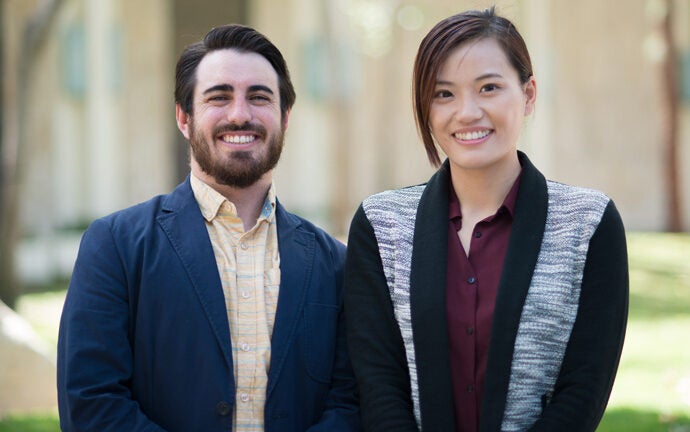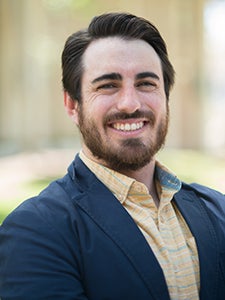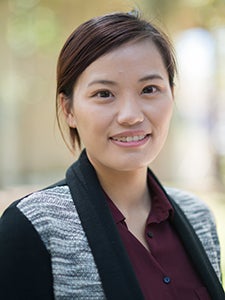
Guided by ‘What If?’
Doctoral researchers Keith Pluymers and Zhe Zhang followed very different paths to USC Dornsife — however, their motivations were essentially the same.
As children, both dared to imagine that they could make a difference in the world.
“When I was little, I always wondered, ‘What if I could develop something that was really important for society?’ ” said Zhang, who will graduate as a doctor of chemistry at USC Dornsife’s Ph.D. hooding ceremony on May 14 at Cromwell Field. “That is why I think I chose to pursue organic synthesis as my specialty — it is the most direct path to pharmaceutical drug development.”
While Zhang was growing up in a small city in China with aspirations of curing diseases, Pluymers discovered his curiosity about land use and environmental history when he was a child in rural New Jersey.
“Most people don’t think of New Jersey as farmland, but it is called the garden state for a reason,” said Pluymers, who will receive his Ph.D. in environmental history. “When I started elementary school, you could only see corn, blocking the windows. But by the time I went on to middle school, there was nothing out the windows but tract housing.”
This dramatic shift in landscape planted the seeds for Pluymers’ long-term research project on land use — specifically English colonial expansion during the 16th and early 17th centuries.
“I look at how English people understood nature and how that influenced resource management in the first three English colonies,” explained Pluymers, who recently defended his dissertation, “Colonizing Lands and Landscapes in the English Atlantic, c.1580-c.1640.”
Zhang also capitalized on USC’s resources to conduct consequential research. In June, she will defend her thesis, “Development of Fluoroalkylation Methodologies and Mechanistic Studies,” which describes how the element fluorine may be able to help create new medical treatments and improve upon ones already on the market.

Keith Pluymers.
After graduating from Peking University, Zhang came to USC in 2009 looking to expand upon her undergraduate studies. She found her niche working under the supervision of Surya Prakash, George A. and Judith A. Olah Nobel Laureate Chair in Hydrocarbon Chemistry and professor of chemistry, and George A. Olah, Nobel Laureate and Donald P. and Katherine B. Loker Distinguished Professor of Organic Chemistry.
“We are working on various methods to introduce fluorine to organic molecules for potential pharmaceutical applications,” Zhang said. “Lipitor, the world’s best-selling drug for more than a decade, is a successful example of employment of fluorine chemistry.”
Like Zhang, Pluymers came to USC with a wealth of knowledge and a hunger to conduct more in-depth research.
“I did my undergraduate honors thesis at the University of Delaware on the introduction of English cattle into 17th-century Ireland and the way in which new animal husbandry practices and new breeds of cows were culturally, economically, politically and ecologically impactful,” Pluymers said. “From there I was able to see how land use connected to concepts such as politics, religion and revolution.”
At USC Dornsife, Pluymers studied under Peter Mancall, Andrew W. Mellon Professor of the Humanities and vice dean for the humanities, and Cynthia Herrup, professor emerita of history and John R. Hubbard Chair in British History emerita, elucidating how environmental practices from centuries ago are still relevant today.
Throughout the process, he traveled to visit archives in Ireland and the United Kingdom as well as the Virginia Historical Society and The Huntington Library, Art Collections and Botanical Gardens in Pasadena, California.

Zhe Zhang.
“I think that understanding how people tried to manage and define resources in the past gives us crucial context for now,” he said, “particularly in that it shows how defining something as a resource reflects historically specific political and cultural values.”
He offered trees as an example.
“In the early-modern world, different users of forests had different goals,” Pluymers said. “If you were a small tenant farmer, you wanted the right to let your pigs out into the forest to eat acorns so you could provide meat for your family.”
However, he said, the English government wanted tall straight timbers and oaks to use for shipbuilding and the Navy.
“Looking at history helps us to see the ways in which politics and culture determine what we value in nature and explains why we protect some plants, animals and landscapes but not others,” Pluymers added.
Through meticulous research and work that has real-world application, both Zhang and Pluymers have secured prestigious fellowships for the Fall. Zhang will be a postdoctoral fellow at Weill Cornell Medical College’s Molecular Imaging Innovations Institute in New York City. Pluymers accepted a postdoctoral instructor position at Caltech in Pasadena teaching undergraduate courses and developing his dissertation into a book.
Ultimately Pluymers hopes to secure a professorship to continue exploring the history of resource management and sustainability.
Zhang will integrate biology and medicine into her already-strong foundation in chemistry.
“Right now one of the greatest problems regarding health care is detecting disease before patients experience symptoms,” Zhang said. “One part of my work is aimed at helping doctors improve the ability to screen for problems earlier.” Her research might also lead to methods of illuminating tumors, so that surgeons will be able to extract them more precisely.
Although Zhang plans to stay in the United States for at least a few more years, her ultimate goal is to move with her husband to his hometown in southern China — where she believes she can make the greatest difference.
“The Chinese government is working to improve education and research there, and we want to take our experience from this country back to help in that effort,” Zhang said. “As a research faculty member, I hope to impact society not only by developing my own research, but also by educating future generations who can make even greater changes to the world.”